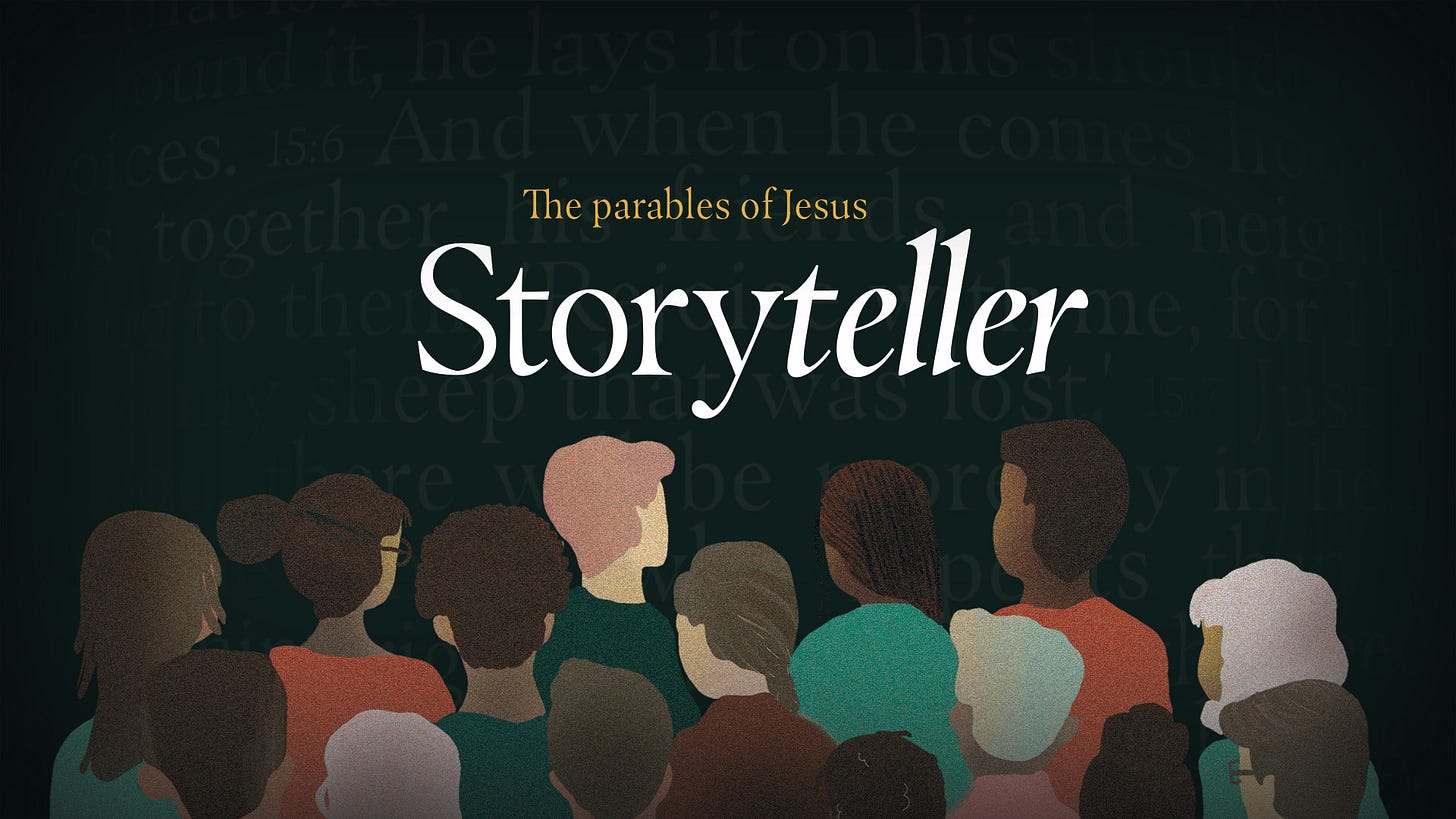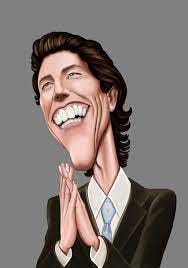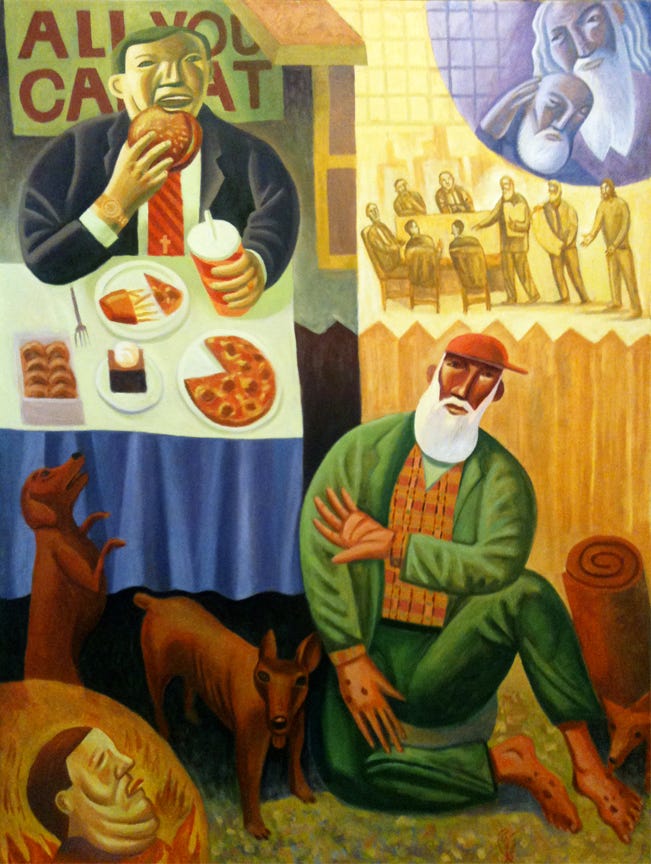Nurturing God,
you give life to all things
and long to satisfy the needs of your children
in their desire for healing and wholeness.
Send your Spirit upon us this day,
that as we hear your word we may meet Jesus,
the one in whom all our hungers are fed. Amen.[i]
When Jesus talks about Hell, well, we get uncomfortable. But Jesus talks more about Hell than Paul and Peter and the prophets Isaiah, Daniel, and Ezekiel combined. Check your pew Bible if you don’t believe me.
Jesus describes two men.

The first is a rich man. Jesus does not tell us the man’s name. He is dressed to the nines. Today this would be a person who shops in stores along M Street in Georgetown and at Tysons II. When we read in scripture that someone is dressed in “purple and fine linen,”[ii] the writer is signaling that the person described is in the upper echelons of society. But this rich man is not your average rich man. He dresses in purple and linen every day. He isn’t dressing up only when he goes to a dinner party at the country club. He isn’t dressing up to meet friends or the in-laws for dinner. No, he is dressing in purple and linen when he as waits for his servants to pours his morning cup of coffee, when he waiting in the Benz while his assistant is running errands, and every day while he is feasting sumptuously.
The second is a “poor man named Lazarus.”[iii] This poor man lay at the gate at the front of the rich man’s home, “covered in sores.”[iv] Lazarus lies there daily, longing “to satisfy his hunger with what fell from the rich man’s table.” Lazarus, according to Jesus, has nothing. The only companions he has are the dogs who lick his sores.[v]
While the rich man is inside his home, wearing the best clothing and eating the best food money can buy, Lazarus is outside – wasting away.
Jesus continues the story with the death of both men. Lazarus dies and is carried away by angels. At the same time, the rich man is buried and ends up in Hades, or Hell.

Verse 23 is the point where Jesus’ story either grabs our attention or we check out. While in Hell, the rich man is tormented, but he can see, across a chasm. Abraham and Lazarus are there. The rich man, who had never experienced a moment of torment in his earthly life, now calls out to Abraham for mercy and to send Lazarus with water to cool himself from the flames.
We are in week three of our Storyteller | Parables sermon series. Next Sunday, we will begin to explore how Jesus’ stories invite us to share our gratitude and generosity. Parables are stories using illustrations familiar to the original audience that reveal a Biblical truth. Two weeks ago, Pastor Sara took us through the Parables of the Lost Sheep, exploring how God’s grace is extravagant and sometimes unfair because, as Pastor Sara said, Jesus is in the business of saving losers.
Last week we considered the parable that Robert Capon describes as “the hardest parable,” the parable of the unjust steward. The parable of the unjust steward reveals that Jesus saves those respectability says are beyond saying. Again, Jesus is saving losers.
And today, our lesson is the parable of the rich man and Lazarus. A story of luxury, poverty, Hell, fire, and grace.
To understand what Jesus is talking about in this parable, we must first understand that as Jesus was telling his parables, there was a group following along who were not interested in hearing his world-flipping stories. You must know that wealthy religious leaders had been standing alongside the crowds with their arms crossed, sneering as Jesus said the poor are blessed and the wealthy, well, they need to sell all that they own because it is easier for a camel to fit through the eye of a needle than is for a rich person to enter the Kingdom of God.
The wealthy religious leaders sneering from the sidelines are the Pharisees. The Pharisees are first-century Joel Osteen types, minus the perfect hair, spray-on tan, Botox, and capped teeth. They believed wealth and possessions; material prosperity were signs of God’s blessing and favor. Today we call this group of people preachers of the “prosperity gospel.”
In the eyes of the Pharisees, Jesus has the story backward. It should be the rich man alongside Abraham. According to the Pharisees, if anyone is being tormented it would be Lazarus.
Jesus knows the Pharisees are listening. He can probably see them behind the crowd, arms crossed, disgusted, which is why Jesus goes for the jugular at the closing of his story.
The rich man, who knew Lazarus’ name, knew who Lazarus was enough to command him like a servant after his earthly life but was refused by Abraham. He knew Lazarus’ name. Meaning, he knew Lazarus had laid outside of his home, wasting away.
The rich man then begs that Lazarus be sent to the rich man’s father’s house to warn his family that their fate will be the same should they not change their ways. Again, Abraham refuses the request. They have Moses and the prophets. They have the prophet Amos who warned that the rich would be the first to be sent into exile – the first sent away from the land where they believed God resides. The first became last because they failed to care for the ones they considered last among themselves.

The way Heaven and Hell are presented in the church is often distilled into a directional description.
If you are good – i.e., you follow God’s Top-Ten, attend church every week, give 10% (or more) off the top of your income to the church, care for the poor at every opportunity, vote a certain way, and so on – then you will go up. Up meaning, you’re off to the pearly gates and roads paved with gold.
If you’re not good – i.e., you do not follow God’s Top-ten, do not attend church every week, do not give 10% of your income to the church, don’t care for the poor, vote a certain way, and so on – then you will down. Down meaning, you’re off to Hades for eternity. Not just alongside the worst of the worst; you are the worst of the worst.
What Jesus is getting at in this parable is that our successes cannot save us.
Robert Capon wrote, “it is not success of any kind that saves – not even success in keeping the law; it is only the violent disruption of all success proclaimed by the Gospel of death and resurrection that can lead to true life in the kingdom.”[vi]
Jesus is not telling a parable about Hell, the final judgment, or heavenly rewards. Our lesson is not a story about the afterlife and how to get to where we all want to go. Jesus is extending an invitation to the Pharisees then and today, to his followers then and today, to live as though the Kingdom of God (his kingdom) is already among us. The Kingdom of God broke into the world through Mary’s womb, which the cross or grave could not snuff out.
It can feel as though the chasm is too great. But church, we bear witness to Christ’s chasm crossing, Kingdom ruling, and grace extending every time we gather for worship – proclaiming Christ resurrected and ascended. In our witness to Christ’s Kingdom, we flip how we view the world, setting aside the worth of material lives and instead choosing to put our faith in God’s Grace.
Jesus says the rich man’s family wouldn’t believe a dead man walking into their living room with a Jacob Marley-like warning.
Lucky for us, death did not hold back Christ and does not hold back Christ’s body – resurrected, ascended, and gathered here this morning.
[i] Feasting on the Word, Year C. Vol. 2.
[ii] Luke 16:19, NRSV
[iii] Luke 16:20, NRSV
[iv] Ie.
[v] Ie.
[vi] Capon, Robert. Kingdom, Grace, and Judgment: Paradox, Outrage, Vindication, in the Parables of Jesus. Eerdmans. 2002. Pg. 313.










